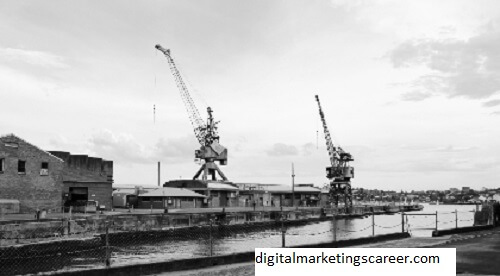Digital Marketing for Industrial Organizations: Steps Toward B2B Success
TD Digital marketing revolutionized an industrial organization in such a way. New customers are now reachable to companies through faster and easier sales, which brings quick business expansion. Industrial organizations are now using digital marketing platforms rather than traditional sales and networking which, to make way for larger markets and because of the extra importance of complex products and services, focuses the attention of the industrial organizations upon these platforms.

This paper will outline the basic components of digital marketing for industrial companies and, hence, reveal methods that enable industrial companies to reach out to their clients, build influence, and compete. Why Digital
Marketing Matters for Industrial Companies:
However, industrial marketing is a bit tough since it demands some special challenges from the industrial sector. Most of the industrial products are of highly customized types and bear higher prices besides a long sales cycle. Moreover, such products or services are marketed through an extremely narrow segment of engineers, procurement managers, and other business decision-makers.
Considering all these factors, conventional marketing techniques cannot be used individually by today’s industrial businesses.
Digital marketing is also one such channel wherein industrial firms can turn to be an industry influencer within their relevant industries. It builds trust with the target customers and ensures education and targeted outreach that reduces the sales cycle.
Industrial organizations can reach out to their public at multiple touchpoints through digital channels. That is a source of valuable information, which shall be used while making a final decision and keeping the brand in mind.
Critical digital marketing for industrial sectors:
B2B and Industrial Slang SEO Search Engine Optimization:
SEO would be crucial to industrial companies in all probability. Such customers would have discovered them during the research stage. Prospects who are looking for specific products or suppliers will usually start with an internet search, typing their Google query and very specific terms in the keyword field regarding the equipment or parts they are seeking, or sometimes even a particular process.
In industry terms, this would thus mean targeting very high-intent keywords, technical specifications, specific certifications, and possibly even niche product names.

Optimization of product pages, blog posts, and even white papers improves the ranking and visibility of sites. Local SEO also applies to the industrial company as well in case it supplies manufacturing plants in some geographically proximate area or operates within an outlined geographic area.
Content Marketing to Inform and Attract:
Industrial products and services are generally very technical, and buyers always require detailed information to make a decision. Content marketing caters to this by providing as much detail as possible to the readers in terms of guides, case studies, videos, and white papers. That details how complicated products, processes, and applications work.
For instance, if you’re a machinery company that deals with manufactured machines. Then you would be creating tutorials on just how that specific machine works or writing blog posts on why it’s so pivotal in a given industry. And that’s the kind of content that gets in front of the right customer and builds credibility for a company.
This learning-based campaign also generates leads with question-based questions, building trust, and then shaving time off the sales cycle.
Email Marketing and Automation:
Email marketing can prove to be a very effective lead-nourishing technique for industrial companies to stay at the top of the mind of the desired audience and also market new products or services. It can be developed and customized by industrial categories, positions, and previous engagements.
This means that the longer sales cycles can be automated in e-mail workflows. And that the business itself may tailor the communications it sends out to almost every step that the buyer is taking. Newsletters and periodic follow-up e-mails keep the leads active and keep them up to date with news regarding product updates, industry news, and events that may arise in the future.
Pay-Per-Click Advertising for Specific Keywords:
PPC Advert Serving. This is when industrial firms create a presence in search engines for given keywords. PPC advertisements, therefore, can always provide immediate visibility. While comparatively speaking, performance sometimes could only be realized after months vis-à-vis SEO.
For instance, Google Ads enables targeting of the high-intent keywords, and thus being sure to pop up when prospects are searching for relevant products or services.
PPC is a great niche play because companies can target an extremely narrow audience, but not solely on organic search traffic. Another nice touch is remarketing ads because they keep in front of users who came previously to the site but did not convert and remind them of the company’s offerings.
LinkedIn and Industry-Specific Social Media:
Hence, in prospect, LinkedIn is a very powerful industrial marketing tool since it indeed connects companies directly with the B2B decision-makers. It can also be used industrially- showing products, and news to the industry. And also has a thought leadership element through writing articles or contributions to levant groups.
In addition to LinkedIn, an organization should look for industry-oriented websites. Some of the industries whose forums or social media networks offer great communication between professionals in terms of products and market trends can be exploited to create or join discussions and reply to questions, share rich knowledge, or even reach out to a target market through such.
Video Marketing for Product Demonstrations and Training:
Industrial products normally require an illustrative description, and the most effective video marketing explanation tool is conducted here. Companies can describe through videos how their products should be installed and even used.
On this point, the video in industrial robotics company would inform on how their robots work in the production line. The focus of the video, on this point, will be efficiency and accuracy technology. In-house training videos may prove even more helpful, for instance. The video could take the user through the operation or maintenance of the equipment; especially in the case of complex machinery.
Videos uploaded to YouTube or straight to the website make the interactive experience more appealing and allow leads to learn more about the products.
Success Metrics in Industrial Digital Marketing:
Measuring the performance metrics informs if the campaign runs well and gives room for its optimization over time. Among the most important things to be measured in industrial marketing are:
- Website Traffic and Engagement: Through Google Analytics, one can monitor visits to a website based on visitor behavior. This may indicate how the user is engaging with the website’s content, which could be shown on specific pages.
- Conversion Rate of Leads: Conversion rates are tracked to ensure that calls-to-action, landing pages, and form submissions are working well.
- Click-through rates of PPC and email campaigns: Click-through rate is an effective metric of engagement. How many users are interested enough to click an ad or link in an email?
- Return on Investment: Return on investment on every one of the marketing channels can be determined. Which one produces better results with less cost?
Conclusion:

It assists industrial companies in communicating with a defined set of customers, demonstrating their expertise, and establishing long-term relationships; hence, it is quite valuable for industrial companies as a digital marketing tool. Becoming a powerful industrial giant can be materialized through orientation on different macro-industrial digital marketing strategies like SEO, content marketing, email campaigns, PPC, and social media.
Given that industrial buyers are seeking proper online purchasing resources. Conducting intense research in digital channels, terms embracing digital marketing will thrive in the competitive B2B space.
